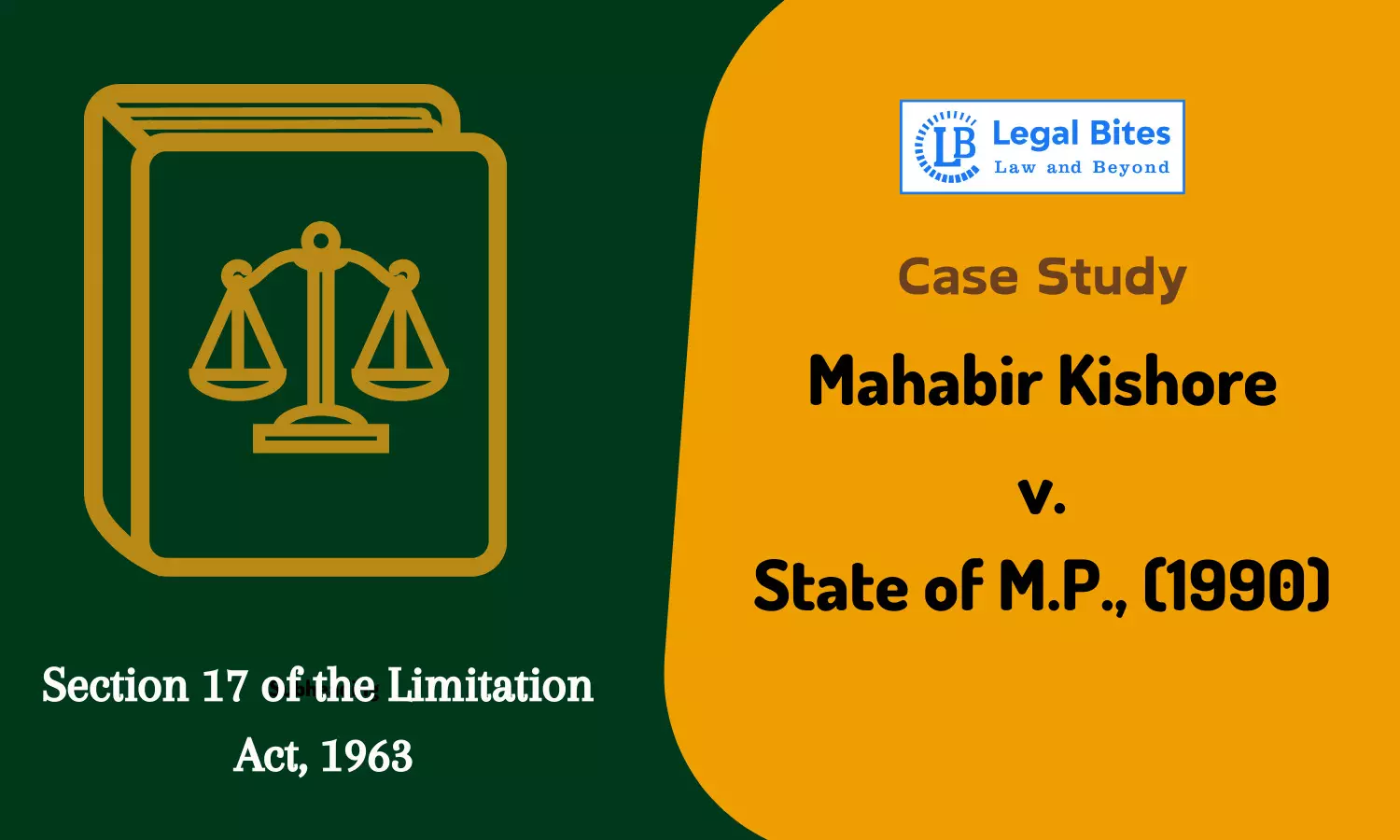Case Study: Mahabir Kishore v. State of M.P., (1990) | Section 17 of the Limitation Act, 1963
In Mahabir Kishore v. State of M.P. (1989), the court addressed the matter of condoning delays under Section 17(1)(c) of the Limitation Act, 1963.

In Mahabir Kishore v. State of M.P. (1990), the court addressed the matter of condoning delays under Section 17(1)(c) of the Limitation Act, 1963, particularly in cases involving mistakes of law.
Case Title: Mahabir Kishore v. State of M.P.
Court: Supreme Court of India
Citation: AIR 1990 SC 313
Judges: Justice G.L. Oza; Justice K.N. Saikia
Facts
- Rai Saheb Nandikishore and Rai Saheb Jugalkishore, a registered firm, secured contracts for the sale and manufacture of liquor from the Madhya Pradesh Government for the year 1959 and also the period from January 1, 1960, to March 31, 1961, amounting to Rs. 7,28,100 in total.
- An additional 7.5% mahua and fuel cess was imposed on the auction money, leading to a dispute.
- Despite ongoing petitions challenging the government’s right to charge this fee, the government announced its continuation. Consequently, the firm paid an additional Rs. 54,606.
- The contractors were obliged to abide by the government’s decision on whether to cease or sustain the additional fee.
- Through a judgment in Surajdin v. State of M.P., 1960 MPLJ 39, the Madhya Pradesh High Court declared the collection of the additional fee of 7.5% as illegal. However, the government continued to charge the extra fee.
- Again in N.K. Doongaji v. Collector, Surguja, 1962 MPLJ 130, the High Court held that charging 7.5% above the auction money was unlawful.
- In light of these decisions, on October 17, 1961 through a letter by the Under Secretary, M.P. Forest Department to the Chief Conservator of Forests, M.P., the government stopped charging the additional fee.
- On October 17, 1964, the High Court served a notice to the Madhya Pradesh Government to refund the additional Rs.54,606 paid by the firm. A suit of recovery was to be filed in case the government failed to comply.
- A civil suit was eventually filed on December 24, 1964 in the trial court which the government resisted on grounds of limitation.
- The trial court noted that the period of limitation commenced when the additional fees were paid to the government, therefore the suit was dismissed as it was held to be barred by limitation.
- When appealed, the High Court decided that the limitation period commenced from when the government stopped levying the additional fee, i.e., October 17, 1961, making the suit barred by limitation. Therefore, the said appeal was dismissed.
- Thereafter, the firm approached the Supreme Court.
Issue
- Whether the filing of the suit to recover the additional payment of Rs. 54,606 was barred by limitation?
Laws Applied
- Section 17 of the Limitation Act, 1963 provides relief in the limitation period in case of a mistake or fraud.
- Section 72 of the Indian Contract Act, 1872
Arguments Before Court
- The appellants contended that the High Court made a mistake in holding that the limitation period started running from the date the government stopped levying the additional fee through the letter as it was not communicated to them and no reasonable time was provided to them to exercise due diligence under Section 17.
- The respondent argued that the High Court was correct in holding that day as the starting date of the limitation period as there was no reason for the appellants to get knowledge about it on the same day with reasonable diligence.
Judgment
To decide whether the High Court’s ruling was correct, the apex court first had to establish what the suit was for. It was observed that the additional money levied by the government was a mistake and without authority which was not clear until the High Court’s ruling. Therefore, the court held that the suit was for the refund of money which was paid by the appellants under the mistake of law.
The court examined the notion of unjust enrichment, asserting that it is not fair for a defendant to retain an advantage to the loss of a plaintiff. Section 72 of the Indian Contract Act specifically addresses the responsibility of an individual who receives money erroneously. Consequently, the court emphasized that the failure to reimburse the appellant's funds constitutes unjust enrichment.
The court drew upon the decision in M/s Budh Prakash Jai Prakash v. STO, 1952 All LJ 332, wherein the imposition of sales tax on forward transactions was considered ultra vires. In this case, the court determined that under Section 72, the term "mistake" encompasses both, mistake of law as well as fact. It affirmed the right of a party to reclaim funds paid under a mistake or coercion, and that the recipient of such funds is obligated to refund them. Regarding the issue of time limitation, it was ruled that Section 17(1)(c) of the Limitation Act, 1963 is applicable, and the limitation period only begins upon the discovery of the mistake through reasonable diligence.
The court also relied on D. Cawasji & Co. v. State of Mysore, (1975) 1 SCC 636 wherein the court had observed that in case of a mistake of law, the limitation period does not start running until the judgment declaring such law as void, is passed. The court observed that in situations where a payment is made due to a mistake of law, as opposed to a mistake of fact, the error is generally realized by the party only when a court declares such law as invalid. Identifying a mistake of law is rarely possible unless a judgment affirms the law’s validity, unlike mistakes of fact, which can often be discovered with reasonable diligence or care, even before a court rules on it. The need for a court’s judgment on the invalidity of the law generally signifies that the parties may not readily distinguish legal mistakes without the authoritative intervention of a judicial decision.
Citing Suganmal v. State of M.P., AIR 1965 SC 1740, and Tilokchand Motichand v. H.B. Munshi, (1969) 1 SCC 110, the court observed that the limitation period for recovering money paid in error begins when the aggrieved party becomes aware of the mistake. It clarified that Section 72, coupled with Section 17(1)(c) of the 1963 Act, applies to cases seeking a refund of money paid due to a mistake of law.
This principle was deemed applicable in the instant matter, allowing the limitation period to run from the date on which the law was declared to be void, as determined by a competent court's judgment. The final decision of the government to put a stop to the levying of the additional fee was said to be an internal communication and therefore, at least a week must be allowed for the appellants to exercise reasonable diligence.
In such a scenario, the High Court judgment was set aside and the appeal was allowed. The Supreme Court allowed for the condonation of delay owing to the mistake of law.

